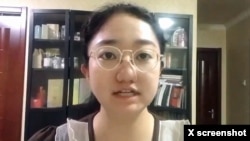Some activists and analysts are saying Monday’s sentencing of a prominent Chinese feminist activist to more than three years in jail shows Beijing’s increasing retaliation against those closely associated with detained activists.
A court in China’s eastern province of Shandong Monday sentenced Li Qiaochu to three years and eight months on the charge of “incitement to subvert state power.” In the judgment, the court accused Li of being “deeply influenced” by detained activist Xu Zhiyong, who is Li’s boyfriend and was sentenced to 14 years in jail on the charge of “subversion of state power” last April.
“This is a typical case of how someone who is closely associated with a detained activist can get into trouble for simply expressing concerns about their detained partner or friend,” Patrick Poon, a visiting researcher at the University of Tokyo, told VOA by phone.
He said the lengthy jail sentence that Li received shows the domestic environment in China has become very restrictive.
“Her case shows that speaking up for other human rights defenders in China has now become a red line in the Chinese government’s eyes,” he said.
Some activists say the heavy sentence that Li received is a clear retaliation for her attempt to talk about the torture that Xu allegedly experienced in detention. “The authorities are purely retaliating against Li for exercising her basic rights and freedom of speech,” Luo Shengchun, the wife of detained human rights lawyer Ding Jiaxi, told VOA by phone.
Since the ruling came after a closed-door trial last month, Luo characterized the length of the jail sentence as “unjust and despicable.”
“I originally thought the authorities may consider allowing Li to go home and celebrate Chinese New Year with her family but they ended up handing her an outcome that is very serious,” she said.
Li, who was a long-time labor rights and feminist activist, has been in detention since February 2021. Although the time she has already spent in custody will count toward her sentence, Luo says she is still concerned about Li’s mental health.
Li suffers from depression and the treatment that she received during detention has caused hallucinations, Luo said.
“Her parents applied for bail 10 times but the Chinese authorities denied all of their applications,” she said, adding that Li was “in a very bad state” when her family members briefly saw her during the court proceeding on February 5.
Apart from Li, her boyfriend Xu Zhiyong and Luo’s husband, Ding Jiaxi, have both been sentenced to more than 10 years in jail for participating in a private gathering in the Chinese city of Xiamen in December 2019. Both been denied permission to meet with their lawyers or family members for several months.
“Their family members in China are facing multiple threats and the authorities continue to postpone their meetings with lawyers,” Luo told VOA. “The authorities have threatened Xu and Ding’s family members in China not to share any information about their cases with the outside world.”
Some researchers see the decision by Chinese authorities to target those associated with detained activists and deny them the right to meet with lawyers or family members as part of a broader effort to increase pressure on activists.
“In the past, the family members and friends of Chinese human rights defenders could still advocate for them, but now, these people are all facing an immense amount of pressure for trying to speak up for the detained activists,” Yaqiu Wang, research director for China, Hong Kong, and Taiwan at Freedom House, told VOA by phone.
In her view, the Chinese government hopes to limit the influence of detained activists by cutting off their communication with the outside world.
“When Nobel laureate Liu Xiaobo was sentenced to 12 years, many people still knew what he had achieved despite Chinese authorities’ crackdown on him,” Wang said. “But nowadays, the Chinese government is trying their best to limit the influence of activists by cutting off all communication channels.”
Apart from Li, several human rights activists in detention and their family members are still awaiting judgments from Chinese courts . Prominent human rights lawyer Yu Wensheng and his wife Xu Yan were arrested by police in April on their way to meet with European diplomats.
On the day Ding and Xu were sentenced to more than 10 years in jail, Yu condemned the Chinese authorities’ decision on X (Twitter at the time), and a day before his arrest, Yu wrote on Twitter, that local police “visited” him because of the tweet.
As it becomes much more difficult for people in China advocate for detained human rights activists, Poon in Tokyo said it is important for outsiders to raise concerns about these cases.
“The only chance for detained activists to receive better treatment in prison is if the international community or overseas activists can bring attention to their cases,” he told VOA.
On the day that the court in Shandong announced judgment on Li’s case, the EU mission to China urged Chinese authorities to release her due to her deteriorating health conditions.
“Li suffers from physical and mental problems and is in urgent need of long-term treatment,” the mission wrote on its official Weibo account.
The Chinese Embassy in Washington did not respond to a request for comment from VOA regarding Li’s sentence or concerns the EU raised on Weibo. There has been no mention of the case in state media.
Since some activists continue to face government surveillance and harassment after being released from jail, Luo said she worries that Li will still face some form of house arrest after she is released later this year.
She expressed hope that outside pressure will force Chinese authorities to “respect some basic legal principles and let Li live a life free from harassment and surveillance with her parents.”






